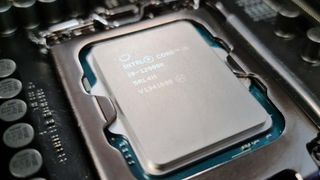Intel's plan to increase chip production using Chinese factory discouraged by US Government
More production could help with the shortages but at what cost?

The great chip shortages are set to continue for a bit longer, as an effort by Intel to up production in China has reportedly been squashed in the United States. The company had put forward the idea to use a factory in Chengdu to increase the production of silicon wafers which could have been set up by late 2022.
While looking into expansion in China, Intel has simultaneously been seeking federal assistance from the United States to increase production and research there. Bloomberg reports that the Biden administration has strongly advised against the move to use the Chengdu factory, according to anonymous sources involved with the deliberations. It’s likely this is due to the current push for more manufacturing within the USA as well as security concerns with tech and China.

Black Friday 2021 deals: the place to go for the all the best early Black Friday bargains.
The United States is currently deciding on whether to restrict investments and may even use outbound investment screening mechanisms to do so. The administration is concerned about China using technologies and investments against national security. Making chips in Chengdu seems to be no exception.
For now it seems Intel is going to comply with the government’s wishes. This is especially unsurprising given the current CHIPS Act waiting to be passed in Congress. It was originally put forward as the Endless Frontier Act, and then received enough votes to pass through the senate back in July as the US Innovation and Competition Act.
No matter the name, this act will see $52 Billion USD funding go to the research and manufacturing of silicon on US soil. It is also being touted as a way to compete with China, and even has some speculating on rules to keep companies involved from accessing the grants.
The chip shortage is a bit of an odd one to deal with. One analysis firm expects there to be overproduction issues in 2023, thanks to all the current efforts to ramp things up, which to be fair has happened before. StMicro's CEO on the other hand, expects the current shortage to last until the first half of 2023 and Nvidia's CEO also doesn't expect the shortage to end any time soon. While AMD's CEO is hoping the shortage will ease late in 2022.
If you are in the market for new computer parts, now is a pretty difficult time to know what to do. We're trying to make it a bit easier with our list of the best CPU Black Friday deals we've seen so far.
The biggest gaming news, reviews and hardware deals
Keep up to date with the most important stories and the best deals, as picked by the PC Gamer team.

Hope’s been writing about games for about a decade, starting out way back when on the Australian Nintendo fan site Vooks.net. Since then, she’s talked far too much about games and tech for publications such as Techlife, Byteside, IGN, and GameSpot. Of course there’s also here at PC Gamer, where she gets to indulge her inner hardware nerd with news and reviews. You can usually find Hope fawning over some art, tech, or likely a wonderful combination of them both and where relevant she’ll share them with you here. When she’s not writing about the amazing creations of others, she’s working on what she hopes will one day be her own. You can find her fictional chill out ambient far future sci-fi radio show/album/listening experience podcast right here. No, she’s not kidding.
Most Popular






